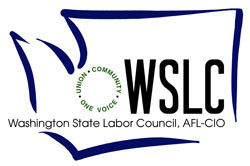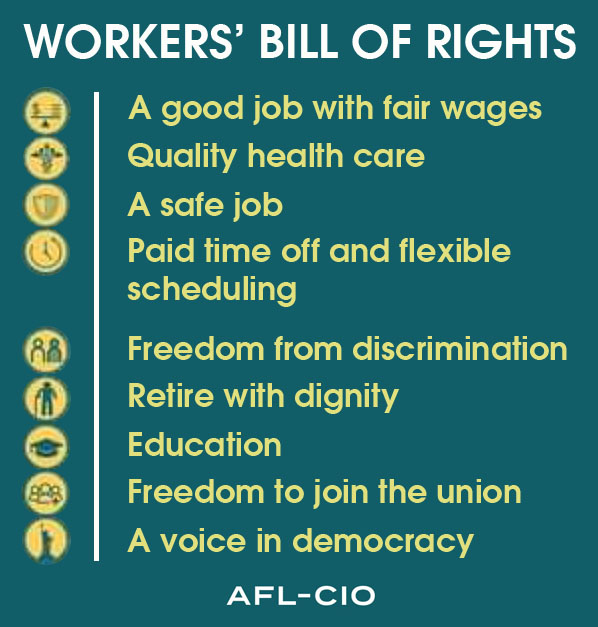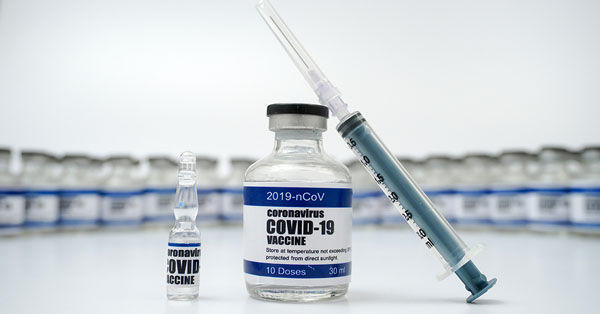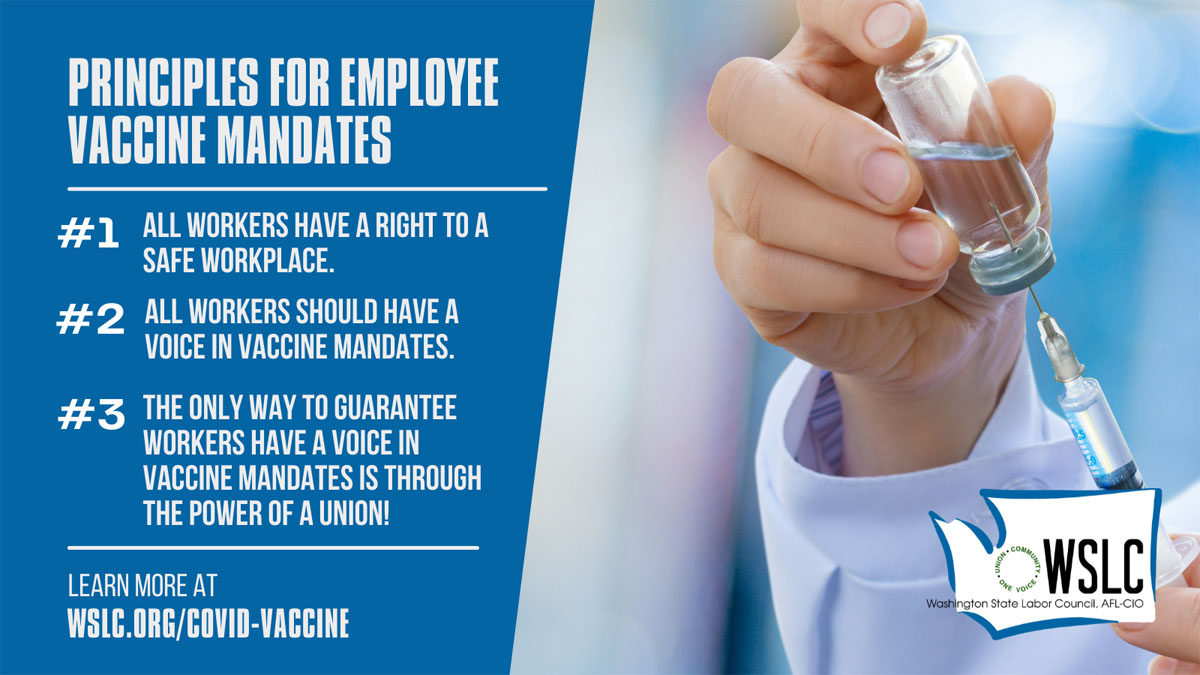TAKE A STAND!
WSLC outlines position on vaccine mandates
As labor continues to support vaccination, WSLC says workers must have a voice in employers’ vaccine policies
UPDATED (Aug. 10) with statements from WFSE, Teamsters Local 117, WSNA, SEIU Healthcare 1199NW and UFCW 21 regarding the vaccine mandate for health care workers and Washington state employees announced by Gov. Jay Inslee on Monday.
(Aug. 9, 2021) — The following is from the Washington State Labor Council, AFL-CIO:
 With the rapid spread of the delta variant of COVID-19, more employers — including Washington’s biggest employer, the state government — are considering COVID-19 vaccine mandates on employees. In response to rank-and-file members’ opinions and concerns, different unions have different positions on vaccine mandates. But the Washington State Labor Council, AFL-CIO, which has been meeting with its affiliated unions on the issue in recent weeks, has identified three fundamental principles that the state’s labor movement shares:
With the rapid spread of the delta variant of COVID-19, more employers — including Washington’s biggest employer, the state government — are considering COVID-19 vaccine mandates on employees. In response to rank-and-file members’ opinions and concerns, different unions have different positions on vaccine mandates. But the Washington State Labor Council, AFL-CIO, which has been meeting with its affiliated unions on the issue in recent weeks, has identified three fundamental principles that the state’s labor movement shares:
1) All workers have the right to a safe workplace.
2) Any proposed vaccine mandate must be subject to bargaining with employers to protect individual workers’ rights.
3) The only way that bargaining is guaranteed to happen is if workers have the power of a union.
With these principles in mind, the WSLC will continue to encourage all union members to get informed about how safe and effective the vaccines are — and to get their shots. But while the WSLC strongly supports reimposing mask mandates in indoor public places, the council will be guided by its affiliated unions on how best to protect the rights and livelihoods of individual members with health, religious, or other legitimate reasons for not getting vaccinated.
 All workers have a right to a safe workplace.
All workers have a right to a safe workplace.
This right is fundamental. It is guaranteed by state law under the Washington Industrial Safety and Health Act, under federal law by the Occupational Safety and Health Act, and it is a basic principle of the International Labor Organization’s Constitution that workers must be protected from sickness, disease and injury arising from their employment.
Throughout the COVID-19 pandemic, steps have been taken by government and employers to slow the spread of the disease and protect workers, particularly those on the front lines of the pandemic, from being exposed to the disease at work. Unfortunately, many of those steps were delayed or have proven insufficient to truly protect workers, and thousands have died as a result of workplace exposure.
The vaccines have represented the world’s greatest hope to finally end the pandemic and begin rebuilding our economy — and lives. But efforts to get enough people vaccinated to stop COVID’s spread have fallen short for multiple reasons. Although it’s fair to blame some vaccine resistance on misinformation and politicization, there are other legitimate reasons why some have not yet been vaccinated, including health conditions and previous severe reactions to vaccines, religious objections, and even now after vaccines have been available for months, lack of access. Some lack transportation to pharmacies, some have inflexible work or family schedules, some can’t afford to miss work to be vaccinated or recover from any of the possible side effects.
The result is that vaccination rates have fallen short of what is necessary to achieve herd immunity, and with the emergence of the highly contagious delta variant of COVID-19, all workers who cannot work remotely once again find themselves at extreme risk of exposure to COVID-19.
That’s why the Washington State Labor Council, AFL-CIO strongly supports reimposing mask mandates at all indoor public spaces in Washington. But even as the WSLC continues to promote vaccination and assist those who struggle with vaccine access, the council cannot support an absolute vaccine mandate that potentially costs workers their livelihoods when they may have a legitimate reason for not getting vaccinated.
Some international unions, including the IFPTE and most recently the American Federation of Teachers, have announced support for a vaccine mandate affecting their members. Others have opposed vaccine-mandate proposals that fail to protect their members’ rights and civil liberties. Some unions are seeking alternative options to vaccination, such as an employer-funded frequent testing. Some unions are insisting on paid leave for vaccination and side-effect recovery before they can agree to a mandate.
But all unions agree that any proposal to require vaccines as a condition of employment is a change in working conditions that requires negotiation with the union.
Any proposed vaccine mandate should be subject to bargaining with employers to protect individual workers’ rights.
 Until recently, few employers have sought to impose vaccine mandates. But now, more and more private and public sector employers are announcing mandatory vaccine policies. Understandably, they want to protect their employees’ safety, while at the same time avoid renewed government restrictions required to “flatten the curve” for our overburdened hospitals and healthcare system.
Until recently, few employers have sought to impose vaccine mandates. But now, more and more private and public sector employers are announcing mandatory vaccine policies. Understandably, they want to protect their employees’ safety, while at the same time avoid renewed government restrictions required to “flatten the curve” for our overburdened hospitals and healthcare system.
In recent weeks, the WSLC has been meeting with its affiliated unions to discuss concerns about vaccine mandates and share best practices for bargaining over their implementation.
“Although different unions have identified different concerns regarding vaccine mandates, the labor movement is unified on two things,” said WSLC Legislative Director Sybill Hyppolite, who leads the council’s team on healthcare issues. “First, we need to continue educating members about vaccine safety and efficacy, and continue urging them to get vaccinated. And second, no employer should be able to unilaterally impose a vaccination mandate without negotiating its terms.”
Several unions released statements Monday in response to Gov. Jay Inslee’s announcement that most state employees — along with hundreds of thousands of health care workers — must get vaccinated as a conditions of employment:
Washington Federation of State Employees/AFSCME Council 28:
“No one has worked harder to combat the COVID-19 pandemic than Washington’s public service workers. WFSE members were among the first to respond to the deadly virus when it appeared in the United States, sounding the alarm on PPE shortages, calling for proper medical screenings in congregate settings, advocating telework for high-risk employees, and enforcing public health policies. Just as we have done over the past 18 months, our union will continue to advocate safe working conditions. WFSE members will bargain the impacts of any vaccine mandate policies to ensure that public service heroes of this pandemic are treated fairly.”
“Any state directive must recognize employee rights and the unions’ right to bargain the impacts of the mandate prior to implementation. There must be clearly stated policies and practices for exemptions. Serial COVID-19 tests must be done on employer’s time and expense. Protocols and practices must acknowledge and mitigate the impact on vaccinated workers who are called in to work mandatory overtime to cover for unvaccinated coworkers. In addition, layoff and recall rights for unvaccinated workers must be established for workers strongly opposed to such a mandate.”
Washington State Nurses Association, SEIU Healthcare 1199NW and UFCW 21:
“We fully expect employers to bargain with us over this change to working conditions. We are facing an extraordinary staffing crisis in our hospitals and continue to advocate for reasonable deadlines and options for frequent testing as well as masking, as required in all health care facilities, for those who are unvaccinated. These provisions mirror those included in mandates in other states that allow health care workers to stay on the job caring for all of us through this ongoing crisis.”
A separate SEIU Healthcare 1199NW statement:
“We will not tolerate discrimination and we will demand racial equity. No worker should be made to wear stickers or other markings to show whether they are vaccinated. Vaccine information must be provided in the language spoken by workers.”
Unfortunately for workers who lack the protection of a union contract, those negotiations are not assured.
The only way that bargaining is guaranteed to happen is if workers have the power of a union.
Workers without a union can have little recourse when new terms of employment, like a vaccine mandate, are imposed upon them. They may be able to hire an attorney if they can demonstrate they are facing discrimination, but few workers have the resources, particularly if they lose their jobs, to pursue justice through the courts.
It’s another reason why a union contract is so important in protecting your rights at work. When workers join together in a union and have a collective bargaining representative, businesses are prohibited by law from making unilateral changes to wages, hours or terms and conditions of employment. That means employers must negotiate a vaccine requirement with the union.
Get more information about how you can join together with co-workers and get a union contract that protects your rights at work. Or go ahead and contact a union organizer today.






